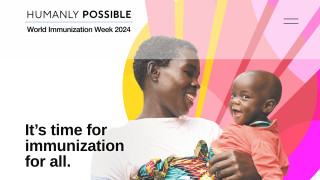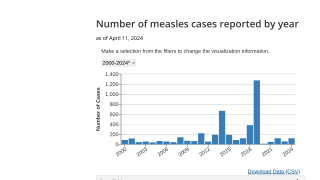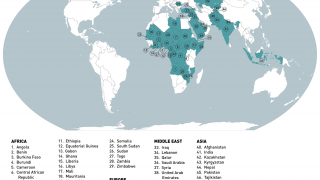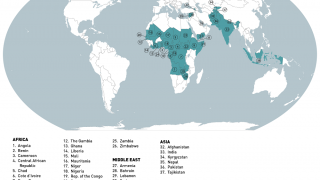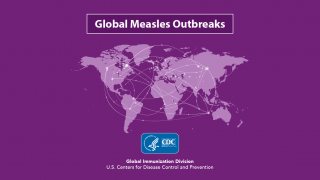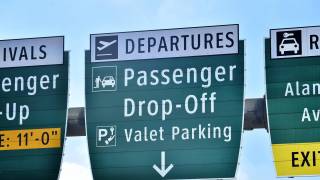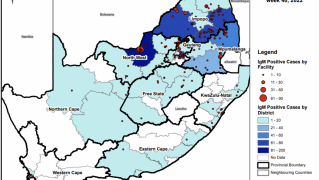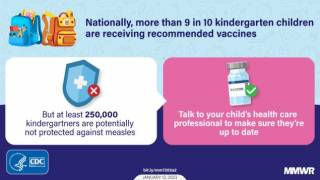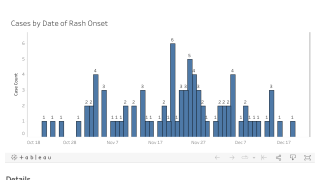Is Wimbledon Requiring Measles Immunity From Patrons?

When the All England Lawn Tennis and Croquet Club hosts over 450,000 tennis fans between July 1 - 13, 2019, are patrons being required to present measles immunization proof prior to entry?
This question is relevant since ‘The Championships, Wimbledon’ is taking place in one of the world’s measles hot-spots.
Measles is so contagious that if one person has it, up to 90 percent of the under-vaccinated people ‘sitting’ close to that person who are not immune, will also become infected.
During the first quarter of 2019, there were 231 confirmed cases of measles in the United Kingdom (UK). Which follows the 971 confirmed cases in 2018.
Specifically, the ongoing measles outbreak in greater London is primarily occurring in under-vaccinated communities, particularly those with links to other countries with ongoing measles outbreaks, such as France (1,749) over the past year.
Alternatively, Wimbledon could offer its tennis patrons access to on-campus measles vaccination services.
A recent case-study for Wimbledon to emulate is the Indianapolis 500 race last May, which offered its 300,000 patrons easy access to on-campus, vaccination clinics.
Furthermore, recent reporting by UNICEF indicates the UK has a significant under-vaccinated youth population. UNICEF says there were 527,000 children in the UK who had not received the first measles vaccine dose during 2010 - 2017.
Moreover, Public Health England (PHE) reported only 87.4 percent of UK children age 5 had received the 2nd measles vaccine dose.
That is far below PHE’s 95 percent vaccination rate goal.
Dr. Mary Ramsay, Head of Immunisation at Public Health England said in a statement on May 24, 2019, “Measles can kill and it is incredibly easy to catch, especially if you are not vaccinated. Even one child missing their vaccine is one too many – if you are in any doubt about your child’s vaccination status, ask your GP as it’s never too late to get protected.”
To better educate the UK population of the health risks from the measles virus, PHE published this information:
What is measles?
- Measles is an acute viral illness caused by a morbillivirus of the paramyxovirus family.
- Measles is a high-contagious, single-stranded RNA virus. There are 24 described genotypes, many of which have been eliminated as part of the global control of measles. Less than 10 genotypes are currently found globally, the distribution of which varies across geographic areas.
Preventive measles vaccination
- The most effective way to control measles is by achieving high uptake of two doses of measles, mumps, rubella (MMR) vaccine.
- In the UK, children receive 2 doses of the MMR vaccine as part of the routine childhood immunization schedule.
Post-exposure prophylaxis (PEP) for measles virus
- PEP for measles has historically relied on the use of normal immunoglobulin or measles vaccination of vulnerable contacts. However, the effectiveness of post-exposure prophylaxis is limited and achieving high coverage with 2 doses of the MMR vaccine in the general population remains the optimal way to protect individuals.
- Measles starts with a 2 – 4-day illness (‘prodromal phase’) before the rash appears, which typically includes high fever, coryzal symptoms, cough, and conjunctivitis.
- The risk assessment for each identified contact will depend on their exposure risk and their likely susceptibility. For immunosuppressed contacts, an appropriate assessment of the nature and level of immunosuppression is central to a decision about PEP.
Additionally, to increase awareness of the UK expanding measles outbreak, the US Centers for Disease Control and Prevention (CDC) and the Canadian government reissued Level 1 Travel Alerts on June 18, 2019.
These Travel Alerts suggest before traveling to London, international travelers are encouraged to confirm their measles immunization status with a healthcare provider.
>> Private Immunity Test Available thru Ulta Labs <<
If you are traveling abroad from the United States, there are 2 measles-containing vaccines available; the measles, mumps, and rubella (MMR) vaccine, and measles, mumps, rubella, and varicella (MMRV) vaccine.
The MMRV vaccine can only be used for children aged 1 through 12 years.
If you and your travel companions have received 2 doses of a measles-containing vaccine, you have sufficient protection against the disease. You are also protected against measles if you have laboratory evidence of immunity, laboratory confirmation of measles disease, or if you were born before 1957.
As of June 10, 2019, the CDC updated its private sector vaccine prices for general information.
And, the CDC’s Vaccines For Children program offers vaccines at no cost to children who might not otherwise be vaccinated because of inability to pay. Additional financial support programs can be found at Vaccine Discounts.
Vaccines, like any medicine, can have side effects. You are encouraged to report vaccine side effects to the CDC.
Our Trust Standards: Medical Advisory Committee
- Wimbledon Tennis & Measles Should Not Mix
- Should Indy 500 Staff Validate Their Measles Immunities?
- National Immunisation Network conference 21 – 22 May 2019, London
- Confirmed cases of measles, mumps and rubella in England and Wales: 1996 to 2018
- Measles notifications and confirmed cases by oral fluid testing 2013 to 2019 (Q1)
- Health Information for Travelers to United Kingdom, including England, Scotland, Wales, and Northern Ireland




